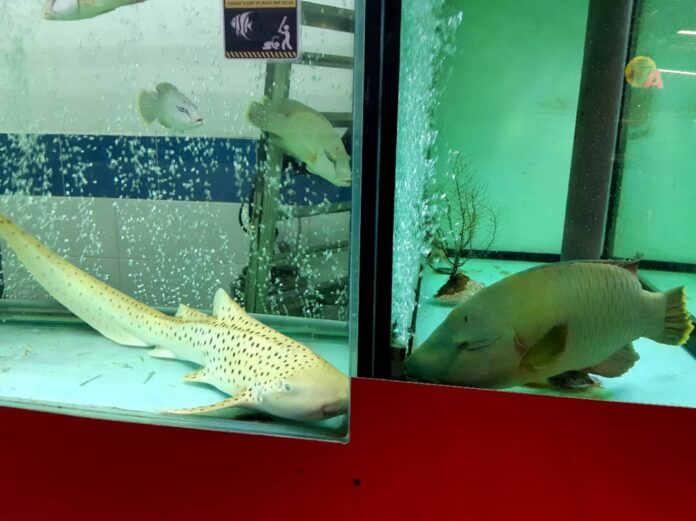The zebra shark and Napoleon wrasse – also an IUCN Red List Endangered species – sit in adjacent tanks.
KOTA KINABALU: Shark researchers and conservationists have expressed concern at reports of a rare species of shark being kept in a tank in a restaurant in Kota Kinabalu.
Images were circulated online of a zebra shark (Stegosoma tigrinum, also known as the leopard shark), being kept confined in a tank inside the restaurant’s eating area.
The shark is listed as ‘Endangered’ on the International Union for Conservation of Nature (IUCN) Red List of species at risk of extinction, with numbers dwindling worldwide.
“It is disheartening to see this threatened shark being kept like this in a restaurant – we can only presume it is there to be sold as food, which is shocking. This is an incredibly rare species of shark, one which should be afforded protection by law, according to its Endangered status,” said Dr Nick Pilcher, Founder and Executive Director of the Marine Research Foundation.
Despite being rare and mainly a nocturnal animal, zebra sharks can occasionally be seen on the reefs around Sabah – they are cited as being particularly graceful when swimming, as their long tail moves like a ribbon through the water.
“It is incredible that this species of shark can still be seen in Sabah,” said Dr Pilcher, “Yet sad that one is being kept in this manner for consumption.”
Dr Pilcher also drew attention to another rare species being kept with the shark: “A juvenile Napoleon wrasse is being kept in the tank with the shark, with an adult female Napoleon wrasse in another tank alongside the zebra shark. These fish are also listed as ‘Endangered’ on the IUCN Red List, and are only regularly sighted in protected areas, such as Pulau Sipadan.”
Although listed as Endangered by IUCN, neither species is protected by law in Sabah, outside of Sabah Parks gazetted areas.
This issue is being engaged by a group of NGOs as part of the Sabah Shark and Ray Initiative, including LEAP Spiral, Forever Sabah, WWF-Malaysia, Marine Research Foundation, Scuba Junkie SEAS and the Sabah Shark Protection Association.
“From a conservation perspective, it is frustrating to see these animals being kept in this manner – or landed and sold in fish markets, especially when so many government bodies and NGOs are working together to protect the incredible marine biodiversity found in Sabah. Endangered species such as these should be afforded full protection by law, and not exploited by restaurant owners and traders.” stated Dr Pilcher.
“Now is the time to consider adding more species to the protected list, such as species identified by the IUCN as ‘Endangered’ – like the zebra shark. It would mean that these incredible animals are protected outside of the confines of our marine parks.” added David McCann, Conservation Manager at Scuba Junkie SEAS.
Affording legal protection to endangered species, while a complex issue, can be achieved through both regional and global assessments, such as those carried out by the IUCN, to determine best practice suited to a particular area.
Marine protected areas have been a notable success for shark conservation in Sabah, particularly for Pulau Sipadan, which gained international recognition in the recently published Global Fin Print study.
The study, carried out in 2015, found that despite sharks being “functionally extinct” in 20% of the world’s reefs, well-enforced protected areas – such as Pulau Sipadan – had abundant and thriving populations of sharks.
Dr Pilcher stated, “In the interim, or even alongside legal protection, it would be worthwhile considering management measures such as time area closures, where highly sensitive or important shark areas can be closed off during some months to afford better protection to the sharks from fishing operations.”
Sabah has an opportunity to show that it can build on this success by protecting rare species outside of Marine Parks, through adding more rare species to existing lists of species that are protected by law.
David McCann enthused: “Sabah has been recognised internationally for the incredible biodiversity and rare species found here. Protecting these species by law would enable local conservation efforts, which could in turn have positive ramifications from a global conservation perspective, as well as benefitting ecotourism.”
“When tourism reopens, every effort made to protect Sabah’s biodiversity, and make Sabah stand out from a global perspective, is important.”
McCann summed up, “But for now we ask that appropriate action is taken for the welfare of the shark and wrasse in these pictures. The spectacle in the restaurant is not one we would like to see representing Sabah on a global social media platform.”


